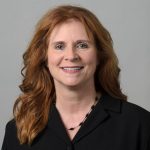 Associate Professor Laura Donorfio and others at UConn Waterbury hosted the campus’s first Pride Party. See the full story here.
Associate Professor Laura Donorfio and others at UConn Waterbury hosted the campus’s first Pride Party. See the full story here.
Faculty
Laura Donorfio, HDFS Faculty Spotlight, April 2023
 Dr. Laura Donorfio has been a part of the Human Development and Family Sciences Department since 1989, receiving her MA and PhD with concentrations in adulthood, aging, and gerontology and intergenerational relationships. During graduate school, Laura’s research focused on family caregiving and filial responsibility. Laura was one of the first in her field to qualitatively capture the dyadic, lived experiences of caregiving daughters and care-receiving mothers. Laura also spent time during graduate school working with the Connecticut Departments of Education and Aging on the Connecticut Aging Awareness Project (AoA grant), developing curricula on aging and intergenerational exchange projects to promote education for, with, and about older adults in an aging society. At that time, Connecticut was one of only three states to advance generations’ education through K-12 schools. Upon graduation, Laura was recruited by The Hartford Financial Services Group as a corporate gerontologist and director of qualitative consumer research, conducting primary, applied research with AARP and the MIT AgeLab where she served as a visiting scientist. In this capacity, Laura utilized a myriad of qualitative methods, including facilitating over 400 focus groups nationally. One of her key research projects was a mixed-methods study with the MIT AgeLab involving a national survey of over 10,000 older drivers to help understand how they can continue driving safer for a longer period through utilizing various self-regulation strategies. Laura was featured on both WNPR’s Where We Live and the Connecticut Television Network (CT-N) to discuss this research and the health and safety implications for older drivers and families surrounding various transportation options and the decision to continue driving. During this period, Laura continued to teach part time at UConn.
Dr. Laura Donorfio has been a part of the Human Development and Family Sciences Department since 1989, receiving her MA and PhD with concentrations in adulthood, aging, and gerontology and intergenerational relationships. During graduate school, Laura’s research focused on family caregiving and filial responsibility. Laura was one of the first in her field to qualitatively capture the dyadic, lived experiences of caregiving daughters and care-receiving mothers. Laura also spent time during graduate school working with the Connecticut Departments of Education and Aging on the Connecticut Aging Awareness Project (AoA grant), developing curricula on aging and intergenerational exchange projects to promote education for, with, and about older adults in an aging society. At that time, Connecticut was one of only three states to advance generations’ education through K-12 schools. Upon graduation, Laura was recruited by The Hartford Financial Services Group as a corporate gerontologist and director of qualitative consumer research, conducting primary, applied research with AARP and the MIT AgeLab where she served as a visiting scientist. In this capacity, Laura utilized a myriad of qualitative methods, including facilitating over 400 focus groups nationally. One of her key research projects was a mixed-methods study with the MIT AgeLab involving a national survey of over 10,000 older drivers to help understand how they can continue driving safer for a longer period through utilizing various self-regulation strategies. Laura was featured on both WNPR’s Where We Live and the Connecticut Television Network (CT-N) to discuss this research and the health and safety implications for older drivers and families surrounding various transportation options and the decision to continue driving. During this period, Laura continued to teach part time at UConn.
In 2004 Laura joined the HDFS department at UConn Waterbury (Laura believes fate was involved as she was born in Waterbury). It was the first-year students were able to complete one of four-degree programs on the regional campuses and Laura led the establishment and growth of the HDFS major. To do so, Laura worked with UConn’s Center for Excellence in Teaching and Learning (CETL) to develop a unique interactive television (iTV) platform to deliver her courses across three campuses simultaneously, while physically rotating between campuses. Laura’s goal was to establish and grow the HDFS major by creating a physical presence on each of the campuses. During this time, Laura continued her research with the MIT AgeLab on older drivers and had the unique opportunity to begin partnering with UConn Waterbury’s Osher Lifelong Learning Institute (OLLI, established in 2006) conducting intergenerational research and generating new and innovative intergenerational curricula and service-learning programs. Again, working with CETL, Laura honed her scholarship of teaching and learning, developing innovative andragogy and geragogy platforms as well as a taxonomy of risk-taking relative to activities in the classroom. At the departmental level, Laura helped develop the HDFS minor in gerontology.
Laura has been deeply involved in leading educators internationally through the Academy for Gerontology in Higher Education (AGHE) and the Gerontological Society of America (GSA). She started AGHE’s first Teaching Institute in 2000 and continues to run it today. She has chaired multiple committees for AGHE and GSA. Laura has co-authored a book, The Gerontology Field Placement: Internships and Practicums in Aging (2023, Springer Publishing).
Laura holds fellow status in both the AGHE (2009) and CETL (2018). She has been honored both internationally and locally for her many teaching accomplishments, including AGHE’s Distinguished Teacher designation (2009) and most recently the GSA’S and AGHE’s Clark Tibbitts Award (2022), given each year to one individual that has made an outstanding contribution to the advancement of gerontology and/or geriatrics education. At UConn, she has been awarded the CLAS Excellence in Teaching Award (2018) and the Alumni Faculty Excellence Award in Undergraduate Teaching (2019).
As a result of appearing with her son on a reality television show called “Dragnificent!” (2020), Laura’s present research interest centers on aging drag queens and how drag expression interfaces with dragism, coping, resilience, and generativity. Outside of work, Laura is a certified educator for the Archdiocese of Hartford’s Adult, Teen, and Child Lures Prevention Program, having educated over 2,000 individuals on sexual predator awareness and safety. On the home front, Laura has 22-year-old twins she is trying to help make their way in the world and a bearded dragon named Tina. When time allows, Laura enjoys spending time with family and friends eating, drinking, watching movies, and having deep conversations about the intrigues of life.
Caitlin Lombardi featured in UConn Today
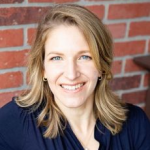 Assistant Professor Caitlin Lombardi featured in UConn Today for her research demonstrating that children whose parents became newly eligible for Medicaid coverage under the ACA demonstrated approximately 2.3% higher reading scores. Read the article here.
Assistant Professor Caitlin Lombardi featured in UConn Today for her research demonstrating that children whose parents became newly eligible for Medicaid coverage under the ACA demonstrated approximately 2.3% higher reading scores. Read the article here.
Lisa Eaton and Ryan Watson featured in CLAS Connections
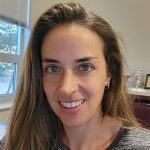
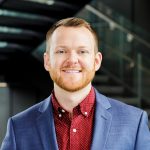 Professor Lisa Eaton and Associate Professor Ryan Watson were featured in CLAS Connections talking about their mentoring relationship and friendship. Check out the article and the video here.
Professor Lisa Eaton and Associate Professor Ryan Watson were featured in CLAS Connections talking about their mentoring relationship and friendship. Check out the article and the video here.
HDFS grad students and faculty present at the SRA conference
8 HDFS grad students and 6 HDFS faculty will be giving 11 presentations at the Society for Research on Adolescence in San Diego in April. See them all here.
Rebecca Puhl receives AAUP Exellence Award- Career
 Congratulations to Professor Rebecca Puhl, winner of the 2023 AAUP Research Excellence Award –Career! This award recognizes all of Rebecca’s outstanding research achievements.
Congratulations to Professor Rebecca Puhl, winner of the 2023 AAUP Research Excellence Award –Career! This award recognizes all of Rebecca’s outstanding research achievements.
Laura Donorfio winner of AAUP Exellence Award-Teaching Career
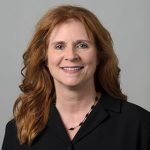 Congratulations to Associate Professor Laura Donorfio, winner of the 2023 AAUP Excellence Awards-Teaching Career! Laura is an amazing instructor and this award recognizes the impact she has had on so many students in her career to date!
Congratulations to Associate Professor Laura Donorfio, winner of the 2023 AAUP Excellence Awards-Teaching Career! Laura is an amazing instructor and this award recognizes the impact she has had on so many students in her career to date!
Sarah Casper receives CETL Outstanding Adjunct Award
Congratulations to Sarah Casper, winner of the 2023 University Outstanding Adjunct Award from the Center for Excellence in Teaching and Learning! Sarah has taught a large range of HDFS courses in both Hartford and Waterbury, and students rave about her courses.
Laura Mauldin profiled in STAT News
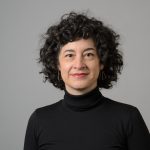
Associate Professor Laura Mauldin was recently profiled in STAT News in their “Living With” series, which “explores the contours of life with chronic illness, from the prelude to diagnosis to new patterns of living, to wrestling with big questions about illness and health”. Read the article here.
Marlene Schwartz featured in Connecticut Public Broadcasting show
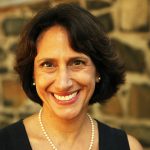 Professor Marlene Schwartz was featured in a Connecticut Public Broadcasting show, Providing healthy and free school lunches for all. Listen to the podcast here.
Professor Marlene Schwartz was featured in a Connecticut Public Broadcasting show, Providing healthy and free school lunches for all. Listen to the podcast here.